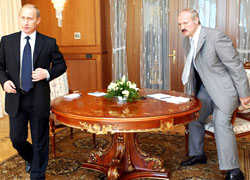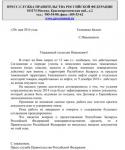No agreements with Lukashenka on oil and gas yet
23- Stas Ivashkievich
- 23.05.2014, 11:54
- 76,679

With his statement Lukashenka simply wanted to postpone the foreign currency panic in Belarus.
There are no yet agreements between Moscow and Minsk on the procedure of oil duties payments. This was officially reported by the press-service of the Russian government. They explained at the institution that the parties had only agreed that the issue of prolongation of the current regulations for next year or their change should be resolved before signing the Eurasian Union agreement.
Price of the issue
As the charter97.org, reported earlier, in 2014 the current bilateral agreement expires. Now Russia supplies crude oil to Belarus free of duty, but when exporting refined products, made from it, Minsk collects duties on Russian duty rates and transfers them daily into the Russian budget.
According to Belarusian State Customs Committee, in 2013 our country paid 3.3 billion dollars to Moscow in oil export duties. Nevertheless, since crude oil duties are higher than oil products duties, Belarus made about 4.5 billion dollars on the difference.
On 9 May, the next day after meeting Vladimir Putin and Dmitry Medvedev in Moscow, Aliaksandr Lukashenka claimed that he agreed with them that starting from the following year Belarus would be able to keep half of the export oil products duties – about one and a half billion dollars, considering the expected drop in the oil prices.
As said above, they disproved the existence of such an agreement at Russia’s government.
The thing is that in exchange for the removal of oil duties Moscow, as explained recently by the Russian vice-Prime Minister Igor Shuvalov, demands of Minsk to remove the benefits for Belarusian producers of tobacco, alcohol and medicines, as well as remove the necessity to license the imports of alcohol and fish.
What Minsk must give up for oil benefits
In order to imagine the price of the issue, consider this: the tobacco market in Belarus is worth about a billion dollars, while its exports in the current year are higher than the exports of nitric fertilizers. Such results were possible to achieve mainly due to the investments on the part of the British-American Tobacco into the Hrodna’s Neman factory, which Belarusian authorities attracted exactly by law excise duties and administrative protection from competitors like Philip Morris. Thus, having leveled the field in this market with other Customs Union’s countries the state will, probably, lose about half the market as well as the possibility to regulate the exports quota of its British partner. In other words – in tobacco alone the price of the issue may reach half a billion dollars – a third of the additional oil revenues, announced by Lukashenka.
The exports of Belarusian medicines last year accounted to about half a billion dollars. The fish imports – over three hundred million. Of strong alcoholic beverages – almost 60 million, and the same amount of Belarus vodka was exported mainly to Ukraine and Russia.
Without going into further detail, the capacity of the domestic market alone, that Moscow demands of the official Minsk to refuse, surpasses the amount of potential oil benefits even in total, leave alone the allegedly promised half of it. Moreover, these cash flows are under the immediate control of the president’s administration and the inner circle businessmen and, unlike the oil duties, do not depend on the Kremlin’s political will.
Negotiation positions
On the other hand, the oil duties incomes are not cash flows that the authorities can skim the cream off, but net costless budget income. That is why Minsk, like the vice-Prime Minister Siamashka said the other day, is ready “in principle” to make the requested concessions, but only on the condition that Minsk will “firmly” keep the Moscow-promised oil benefits. In different words, it will be guaranteed not by a bilateral agreement that the Kremlin may abrogate at any moment (for example, having accused the Belarusian authorities of oil contraband in bitumen disguise), but will be set out for all the Eurasian Union countries.
But this is impossible due to Moscow and Kazakhstan’s difference of opinions. The oil policies of the two countries are incompatible today. The Kazakh crude oil duties are five times lower than the Russian ones. In order to change them Astana will have to reconsider the agreements with transnational oil companies, working in its territory, on each particular oil deposit. The Russian oil sector is practically completely national and in its turn lobbies against changes towards the Kazakh model.
Thus the Russia-Belarus argument over the oil duties now looks as follows. Moscow agrees to remove the duties at the bilateral level in the case if Minsk, at least, makes the concessions in terms of tobacco, alcohol, medicines and fish.
Lukashenka refused to give up his monopolies in exchange for a temporary oil agreement and suggests an intermediate option – half of the export oil duties now in exchange for stage-by-stage changes in the said markets.
Will the SES agreement be signed on 29 May?
Will the parties reach an agreement on 29 May? Not necessarily. The Kremlin, apparently, intends to provide the oil benefits only after Belarus fulfills its obligations as to the four markets, not in exchange for Minsk’s promise to do so. Lukashenka, in his turn, may try to put everything at stake and not give up his position, threatening to wreck the signing the Single Economic Space agreement, hoping that Moscow would back off, considering the difficult geopolitical situation.
That is why the parties may not sign the agreement on 29 May. Truth be told, by the end of the year Lukashenka will likely give up. In case new agreements are not signed before the next year, Moscow may cancel energy preferences for Belarus in terms of both oil and gas. We would remind that this year the agreement on oil duties and Minsk’s contract with Gazprom expire.
There is no loan and there will be none?
As to the two billion loan that Putin and Medvedev allegedly promised Lukashenka on 8 May in Moscow, then this claim of the Belarusian president is even farther from the truth as confirmed by the statement of the Russian government’s press-service. This is the same loan that the Kremlin offered back in 2011 in exchange for the privatization of five assets. But judging by the recent agreements, the parties are as far from solving this issue as they were then. In reality, Minsk, apparently, does not even count on this money.
By his statement Lukashenka simply wanted to postpone the foreign currency panic in Belarus until the agreement on oil benefits is signed, which will raise Belarus’ credit rating and will allow for issuing Eurobonds with an acceptable interest rate.
But Belarusians should still prepare for the turn of events that in July Moscow gives neither money, nor oil benefits promise, and then, depending on the reaction of bank depositors, the government’s ability to support the smooth pace of the Belarusian rouble devaluation will be under serious question.
Stas Ivashkievich, specially for charter97.org










